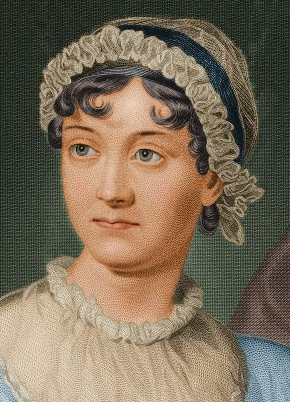Sorry, try again.
Dec 22
2015

Wow, this is the second time in less than a month that I am left rolling my eyes over a respected English professor's opinions about Jane Austen. (Note: Few things make me happier than hate-reading subpar Austen criticism. It's like a Christmas gift from the Internet!) McSweeney's recently published an essay by Amy Watkin, an Associate Professor of English at Concordia College in Moorhead, Minnesota, called "Jane Austen is Probably Mad At Us", and it ranges from overly simplistic to straight-up dumb. Here are my biggest complaints:
"People think that Jane Austen wrote about love with all the drama of a woman perched on a settee in a stiff corset, waiting for something to do, pouncing on the first male she’s not closely related to and begging him to marry her. This does in fact happen in Austen’s books, but only because Austen is making fun of such women. We’re supposed to understand those characters to be ridiculous foils for the deeper, more complicated characters and stories..."Nope. Some of Austen's most complicated characters (Charlotte Lucas, for example) are the ones most desperate to get married. As many women's only "preservation from want", achieving a stable (or at least financially advantageous) marriage mattered to Austen's characters. Even marriage-mad characters that originally seem one-note, like Northanger Abbey's Isabella Thorpe, are living under a gun. I recently read an essay that suggested that Isabella's desperation to re-hook Catherine's brother at the end of the novel might be the result of an unplanned pregnancy—a terrible, life-ruining situation for a young woman already clinging to respectability by the tips of her fingers.
"Her best-known work is called Pride and Prejudice because Elizabeth Bennet is proud and Mr. Darcy is prejudiced. Or it might be the other way around because Austen clearly shows that women and men are equally capable of being hard headed. In Persuasion, Anne Elliot doesn’t care to be married at all if it’s not to her true love, except that her family is making her crazy and she would appreciate some escape (sound familiar in this holiday season, anyone?). And in Mansfield Park, Fanny Price…well, we don’t know exactly what’s happening with Fanny. She may be a glitch in Austen’s system of independent, flawed, female characters. But Mary Crawford picks up some of Fanny’s slack. In Sense and Sensibility, Elinor and Marianne Dashwood come through heartbreak together to find middle ground between sense and sensibility. In Northanger Abbey, Catherine Morland lurks in passageways, blatantly seeking romance because this is also the only Austen novel that is openly satirical. And Emma Woodhouse (from the aptly named Emma) just doesn’t give a damn what anyone thinks."Are you kidding me? Fanny Price is perhaps the most independent Austen heroine. In fact, that's probably what makes her so hard to take for many readers: she doggedly clings to her principles, even when everyone around her is pressuring her to give in. Meanwhile, "independent"(?!?) Mary Crawford is peer-pressured into ditching Edmund Bertram by a group of society friends that she doesn't even like. And Emma "doesn't give a damn what anyone thinks"? For serious? Emma cares what everyone thinks. She's desperate to be liked and admired and looked up to as Lady Bountiful. She despises the new Mrs. Elton for challenging her role in society, she dislikes Jane Fairfax for never seeming as enthusiastic about Emma's company as she should be, and she literally befriends Harriet Smith solely based on Harriet's boundless respect for Emma's (crappy) judgment.
"What made Austen write this way? We don’t really know."Sure we do. Austen wrote this way because she is perhaps the literary world's best example of "write what you know". She wrote about families and money, love and social pressure, making a fool out of oneself and watching other people do the same. She wrote about these things with remarkable wit and intelligence, because she was remarkably smart and funny. We still care about these things because they are issues that shape our lives today. So no, Ms. Watkin, I don't think Jane Austen would be mad at us. She'd be too busy shaking her head over how little has changed.
Posted by: Julianka
No new comments are allowed on this post.
Comments
No comments yet. Be the first!